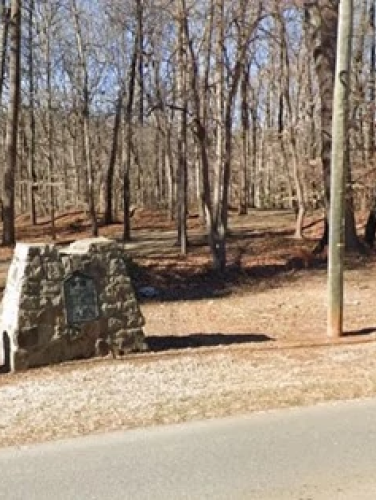
McIntyre's Farm Site
(ca. 1780)
McIntyre’s Farm was the site of an October 1780 battle that prompted Lord Charles Cornwallis and his occupying British forces to beat a hasty retreat from Charlotte.
5801 Beatties Ford Rd, Charlotte, NC 28216
After routing American forces in and around Camden, South Carolina, in August 1780, Lord Charles Cornwallis moved his British troops into North Carolina. His first stop was Charlotte, then a small community attractive to the British primarily because its numerous grist mills would be a ready food supply for his troops. From Charlotte, he planned to go to Salisbury, Salem, and Guilford Courthouse before finishing at Hillsborough, a suspected haven for Loyalist sympathizers. Strategically, the thought was that such an advance through North Carolina would embolden local Loyalists, secure the state for the British, and overwhelm the by-then isolated South Carolina rebels, ending resistance in that state as well. Cornwallis then planned to advance into Virginia to win the war for the King. For his plan to work, it was essential that Cornwallis kept his west flank secure, as the hostile mountain men of the west posed a serious threat. To that end, the British commander would send a large force of Loyalist militia under the command of Patrick Ferguson into the foothills of the Carolina mountains.
Property Quick Links
Cornwallis moved into Charlotte in late September 1780. Although Cornwallis knew the area was not completely loyal, he believed that his presence would intimidate opponents and attract supporters. He overestimated both the numbers and the initiative of the Loyalists. The British found Charlotte most inhospitable. The skirmish at McIntyre's Farm was but one example of the hostility directed toward the unwanted invaders. In early October 1780, a foraging party of some 300 British soldiers marched to the vicinity of the McIntyre Farm (located near what is the corner of Beatties Ford Road and McIntyre Avenue) in search of grain, fodder, livestock, and other supplies. Confident that the number of British soldiers would overwhelm the rebel neighborhood, the foraging party brought several baggage wagons to transport their stolen booty back to Charlotte. They did not get a chance to use those wagons.
Some fourteen Scotch-Irish Mecklenburg County settlers – resentful of the British troops and their intended foraging efforts – armed themselves and headed into the surrounding woods. From concealed locations, the settlers ambushed the plundering invaders, driving them back into Charlotte empty-handed. News of the events at McIntyre’s Farm followed quickly by the devastating October 7 defeat of Ferguson’s forces at Kings Mountain prompted Cornwallis to make an immediate withdrawal back to South Carolina.

